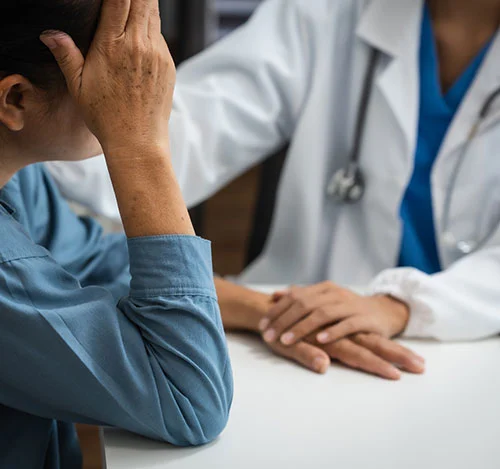
Major Effects of Hormonal Imbalance | Hale Clinics
Hormones are extremely vital for the proper functioning of the human body. They regulate most major bodily processes, including growth and development, metabolism, sexual function, reproduction, and mood. Hormones work synergistically in perfect balance with each other. From birth to death, these powerful hormones control how we grow, develop, and age throughout our lifetime. Any sort of imbalance in these hormones can cause disturbances in the body. In this blog, we will examine some of the major effects of hormonal imbalance in the body.
Table of Contents
ToggleMajor Effects of Hormonal Imbalance
Growth and Development Imbalances:
Hormonal imbalances occurring during childhood and puberty can significantly impact growth and development. For example, growth hormone deficiency can lead to stunted growth in children. On the other hand, excess secretion of growth hormones can result in gigantism, characterized by excessive growth of the hands, legs, and face. During puberty, imbalances in sex hormones like testosterone, oestrogen, and progesterone can impact secondary sexual characteristics. For example, excess testosterone in girls can lead to masculine features, while deficient testosterone delays puberty changes in boys.
Metabolic Disorders:
Many hormones play a crucial role in metabolic regulation. Any disturbance in their levels can contribute to metabolic conditions like diabetes, obesity, and high cholesterol. For instance, excess production of the hormone cortisol increases blood sugar levels and lowers sensitivity to insulin, directly impacting diabetes risk and management. At the same time, deficiencies in thyroid hormone slow down metabolism, leading to unexplained weight gain, fatigue, and high cholesterol. Optimizing hormonal balance is key for maintaining a healthy metabolism and body weight.
Impaired Fertility and Pregnancy Issues:
One of the major effects of hormonal imbalance is menstrual irregularities or female hormone imbalance. Our reproductive capabilities depend greatly on achieving the right balance of male and female sex hormones. Irregular periods, infertility, and recurrent miscarriages can often be caused by hormonal imbalances. In women, conditions like PCOS involve excess male sex hormones that disrupt ovulation, leading to fertility problems. Restoring hormonal balance needs expert care, and finding the right gynaecologist makes all the difference in preventing worsening of issues before they impact quality of life. Those facing these problems should consider booking an appointment at Hale Clinics, which has the Best Gynaecologist in Mohali for restoring hormonal balance in the body.

Bone Loss Risk:
Hormones play a regulatory role in attaining peak bone mass during youth while maintaining bone density through adulthood. Any kind of hormonal disturbance increasing bone loss rate can lead to a high risk of osteoporosis over time. For example, an overactive parathyroid increases calcium loss from bones, making them brittle and prone to fractures. Similarly, low levels of growth hormone and sex hormones (oestrogen, testosterone) during middle age accelerate bone loss in both men and women.
Mood Disorders:
Hormones like serotonin, cortisol, and oestrogen have a direct impact on mood regulation and cognitive functions. Their imbalances are frequently linked to conditions like anxiety, depression, and low stress resilience. For instance, those with high levels of the stress hormone cortisol for prolonged time periods often experience chronic anxiety, insomnia, and depressive thoughts. Establishing hormonal equilibrium is therefore crucial for maintaining sound mental health and preventing mood disorders.
Heart Disease & Cancer Risks:
Chronic hormonal imbalances can increase susceptibility to serious illnesses like cardiovascular disease and cancer in the long run. For example, excessive cortisol encourages fat accumulation in blood vessels, raising blood pressure and the likelihood of heart disease. At the same time, high amounts of oestrogen unopposed by progesterone in women during menopause stimulate excess growth of the uterine lining, leading to an increased risk of developing uterine cancer over time. Getting hormones tested and corrected can lower the chances of such severe health conditions.
Skin, Hair, and Nail Issues:
The condition of our largest organ, the skin, along with hair and nails, depends heavily on having hormonal homeostasis. Androgen excess leads to acne outbreaks along with excess facial and body hair growth. Deficiencies in growth hormone contribute to slow nail growth. On the other hand, an underactive thyroid reflects in characteristic thinning and brittle hair. Restoring the balance of underlying hormones can improve the health and appearance of the skin, hair, and nails significantly.
Conclusion
In summary, the alteration of hormones from their normal balanced state introduces dysfunction in almost every area of our health, from reproduction, development, and metabolism to even impacting immunity, cognition, skin/hair health, and mental well-being.
Understanding the major effects of hormonal imbalance and checking for underlying hormonal abnormalities is prudent for timely and appropriate treatment. Consulting leading endocrinologists such as those at Hale Clinics, which has the Best Endocrinologist in Mohali, can help diagnose specific imbalances through testing and reverse them as much as possible. Achieving hormonal equilibrium goes a long way in attaining optimized health with disease prevention.
FAQs
Q1. What are some key hormones that can become imbalanced?
Ans. Some major hormones that can become imbalanced include growth hormone, thyroid hormone, cortisol, insulin, sex hormones like estrogen and testosterone, and reproductive hormones like follicle stimulating hormone (FSH) and luteinizing hormone (LH).
Q2. How can hormonal imbalances impact children and teens?
Ans. Imbalances during childhood and puberty can affect growth and development. For example, too little or too much growth hormone can lead to growth abnormalities, while imbalanced sex hormones can impact secondary sexual characteristics.
Q3. Can hormonal issues cause infertility?
Ans. Yes, hormonal imbalances can lead to irregular periods, infertility, and pregnancy complications in women.
Q4.Can skin, hair and nails be affected?
Ans. Yes, androgen excess can cause acne and hirsutism. Thyroid disorders can manifest as thinning hair, while growth hormone deficiency can slow nail growth.
Q5. What causes hormonal imbalances?
Ans. Causes include chronic stress, sedentary lifestyle, poor diet, nutritional deficiencies, toxins, medications, pregnancy, infections, tumors, autoimmunity, menopause, age, or unknown reasons.
Q6. What is the best way to correct hormonal imbalances?
Ans. Changes in lifestyle, diet, exercise, along with targeted medical treatment under an endocrinologist’s supervision can help restore equilibrium.
